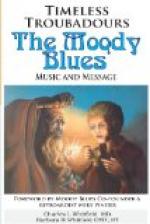Folquet of Marseilles is a troubadour whose life belongs to these years of turmoil. He was the son of a Genoese merchant by name Anfos, who apparently settled in Marseilles for business reasons: Genoa was in close commercial relations with the South of France during the twelfth century, as is attested by treaties concluded with Marseilles in 1138 and with Raimon of Toulouse in 1174. Folquet (or Fulco in Latin form) [79] seems to have carried on his father’s business and to have amused his leisure hours by poetical composition. The Monk of Montandon refers to him as a merchant in his sirventes upon other troubadours. He is placed in Paradise by Dante and is the only troubadour who there appears, no doubt because of his services to the Church. His earliest poems, written after 1180, were composed in honour of Azalais, the lady whose favour was sought by Peire Vidal, and to whom Folquet refers by the senhal of Aimant (magnet). His poems are ingenious dissertations upon love and we catch little trace of real feeling in them. The stories of the jealousy of Azalais’ sister which drove Folquet to leave Marseilles are probably apocryphal. Folquet also addressed poems to the wife of the Count of Montpelier, the daughter of the Emperor of Constantinople. He wrote a fine planh on the death of Barral of Marseilles in 1192 and it was about this time that he resolved to enter the church. His last poem belongs to the year 1195. No doubt the wealth which he may have brought to the Church as a successful merchant contributed to his advancement, but Folquet was also an indomitably energetic character.
Unlike so many of his fellow poets, who retired to monasteries and there lived out their lives in seclusion, Folquet displayed special talents or [80] special enthusiasm for the order which he joined. Of the Cistercian abbey of Toronet in the diocese of Frejus he became abbot, and in 1205 was made Bishop of Toulouse. He then, in company with St Dominic, becomes one of the great figures of the Albigeois crusade: in 1209 he was acting with Simon de Montfort against Raimon VI., the son of his old patron and benefactor, and persuaded the count to surrender the citadel of Toulouse to de Montfort and the papal legate. He travelled in Northern France in order to stir up enthusiasm for the crusade. The legend is related that, hearing one of his love songs sung by a minstrel at Paris, he imposed penance upon himself. He helped to establish the Inquisition in Languedoc, and at the Lateran council of 1215 was the most violent opponent of Count Raimon. To enter into his history in detail during this period would be to recount a large portion of the somewhat intricate history of the crusade. Of his fanaticism, and of the cruelty with which he waged war upon the heretics, the Count Raimon Roger of Foix speaks at the Lateran council, when defending himself against the accusation of heresy.




